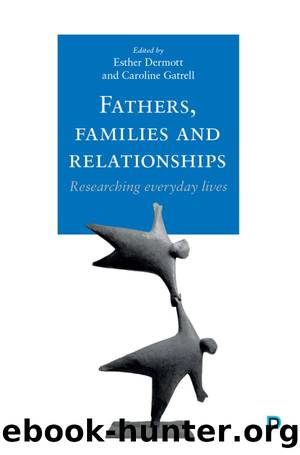Fathers, Families and Relationships by Dermott Esther Gatrell Caroline

Author:Dermott, Esther, Gatrell, Caroline [Dermott, Esther, Gatrell, Caroline]
Language: eng
Format: epub
ISBN: 9781447331513
Barnesnoble:
Publisher: Policy Press
Published: 2018-03-14T00:00:00+00:00
Complexities of the chair
Email, instant messaging, and cell phones give us fabulous communication ability, but because we live and work in our own little worlds, that communication is totally disorganized. (vos Savant, 2010)
Despite experiencing the typical benefits inherent in telecon focus groups, a number of procedural, technological and unpredicted complexities arose during their commissioning. These âtechnical hitchesâ began with problems not directly caused by, but perhaps pertaining to, technology. First, although participants were able to book timed places via the secure website, the focus groups suffered an approximate 30% attrition rate between those fathers who scheduled themselves onto a slot and who (virtually) attended in practice. While no-shows are of course not uncommon in face-to-face proceedings, we wondered whether the comparative lack of commitment and effort required of the participants actually to join one of their chosen telecon focus group â not necessarily needing to organise sanctioned time physically away from the workplace or travel out to a collective point â lessened pressure on them to attend, or even provide forewarning. (A minority of those who absented themselves did subsequently rearrange to phone in to another group on a following day.)The matter of attendance (or otherwise) proved an interesting issue during the running of the focus groups. In the experience of the research team, respondents participating in face-to-face focus groups were unlikely to get up and leave without warning. This was different in the telecon context. Once online with the telecon focus group, all fathers could voluntarily remove themselves from proceedings at any point by simply hanging up; this would be heralded by an automatic voice interjecting and announcing to all that, for example, âJohn has left the conversationâ. We saw this as a potential benefit of the technology â participants could exit the conversation if they wished without explanation (although we also felt it could be difficult to manage the subsequent discussions if participants left without notice).
However, on two separate occasions the technology conspired to erroneously eject chairing members of the research team who had not wished to leave. During the first, there were two researchers online so the other was able to continue the focus group without significant disruption until the outcast member dialled back in. On the second occurrence, though, there was only one chair present, leaving the participating fathers alone for the circa 60-second period it took to reconnect, rejoin and apologise. Interestingly, all fathers had remained present (albeit a little confused) rather than disbanding, enabling the focus group to be recovered. Indeed, the recording facility, which was not interrupted despite the loss of the chairing member, showed that the conversation between these otherwise unconnected individual fathers had continued organically.
Related to these accidental dismissals, another session experienced an unscheduled addition. During one of the focus groups for the private sector company, a father from the public sector organisation mistakenly joined. As detailed below in the discussions between the researchers, the private sector employees (Stephen and James), and the unexpected public sector worker (Ben), it took the
Download
This site does not store any files on its server. We only index and link to content provided by other sites. Please contact the content providers to delete copyright contents if any and email us, we'll remove relevant links or contents immediately.
Cecilia; Or, Memoirs of an Heiress — Volume 1 by Fanny Burney(32558)
The Great Music City by Andrea Baker(32018)
Cecilia; Or, Memoirs of an Heiress — Volume 2 by Fanny Burney(31956)
Cecilia; Or, Memoirs of an Heiress — Volume 3 by Fanny Burney(31941)
We're Going to Need More Wine by Gabrielle Union(19046)
All the Missing Girls by Megan Miranda(16026)
Pimp by Iceberg Slim(14506)
For the Love of Europe by Rick Steves(14121)
Bombshells: Glamour Girls of a Lifetime by Sullivan Steve(14073)
Talking to Strangers by Malcolm Gladwell(13370)
Norse Mythology by Gaiman Neil(13363)
Fifty Shades Freed by E L James(13239)
Mindhunter: Inside the FBI's Elite Serial Crime Unit by John E. Douglas & Mark Olshaker(9339)
Crazy Rich Asians by Kevin Kwan(9291)
The Lost Art of Listening by Michael P. Nichols(7506)
Enlightenment Now: The Case for Reason, Science, Humanism, and Progress by Steven Pinker(7311)
The Four Agreements by Don Miguel Ruiz(6765)
Bad Blood by John Carreyrou(6621)
Weapons of Math Destruction by Cathy O'Neil(6279)
